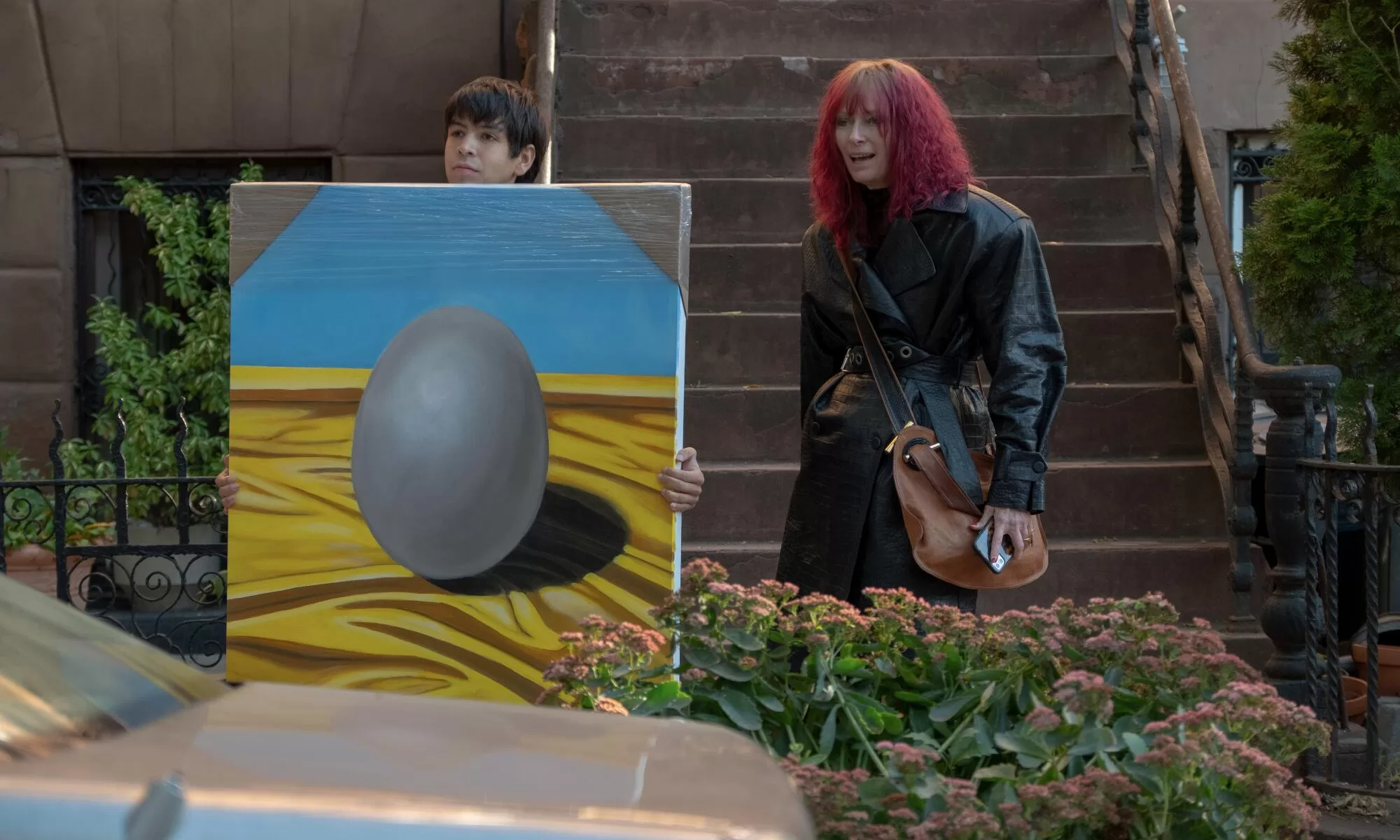He served as a translator for parent-teacher conferences and worked as a personal assistant for busy professionals in New York City, where he still lives. At one point he interviewed for a magician’s assistant position only to find out that his potential employer was not a magician but a saxophone player whose gimmick consisted of having a plastic phallus pop out of his instrument. “He had it in a case next to him and he didn’t show it to me,” says Torres of the penis sax, with some regret. He did not get the job.
One of his more demoralizing gigs consisted of hawking hair-salon packages on the street, approaching random pedestrians with the line, “Excuse me, can I ask you a question about your hair?” His total sales, he recalls, were “zero. None. Not a one.”
This fraught period serves as inspiration for Torres’ new film, “Problemista,” a surreal, comedic fable about a Salvadoran immigrant who must navigate the confounding parallel realities of the New York art world and the U.S. immigration system as he attempts to secure a work visa. The film, from A24, lands in select theaters in Los Angeles and New York on Friday, followed by a wide release in late March. It is a turning point for the actor-comedian, who not only stars in the movie but wrote and directed it.
There are few, if any, voices in U.S. comedy quite like Torres, a performer with a penchant for the odd, the arcane and the fantastically glam — he is evidence that darkly humorous realismo mágico can exist in sparkly human form. Torres first established himself as a writer on “Saturday Night Live,” where he created legendary skits like “Papyrus” (in which Ryan Gosling is tormented over the title font used for “Avatar”). But he is perhaps best known for co-creating, with fellow comedians Fred Armisen and Ana Fabrega, the HBO cult favorite “Los Espookys,” about a group of friends in an unnamed Latin American country who stage fake supernatural experiences.
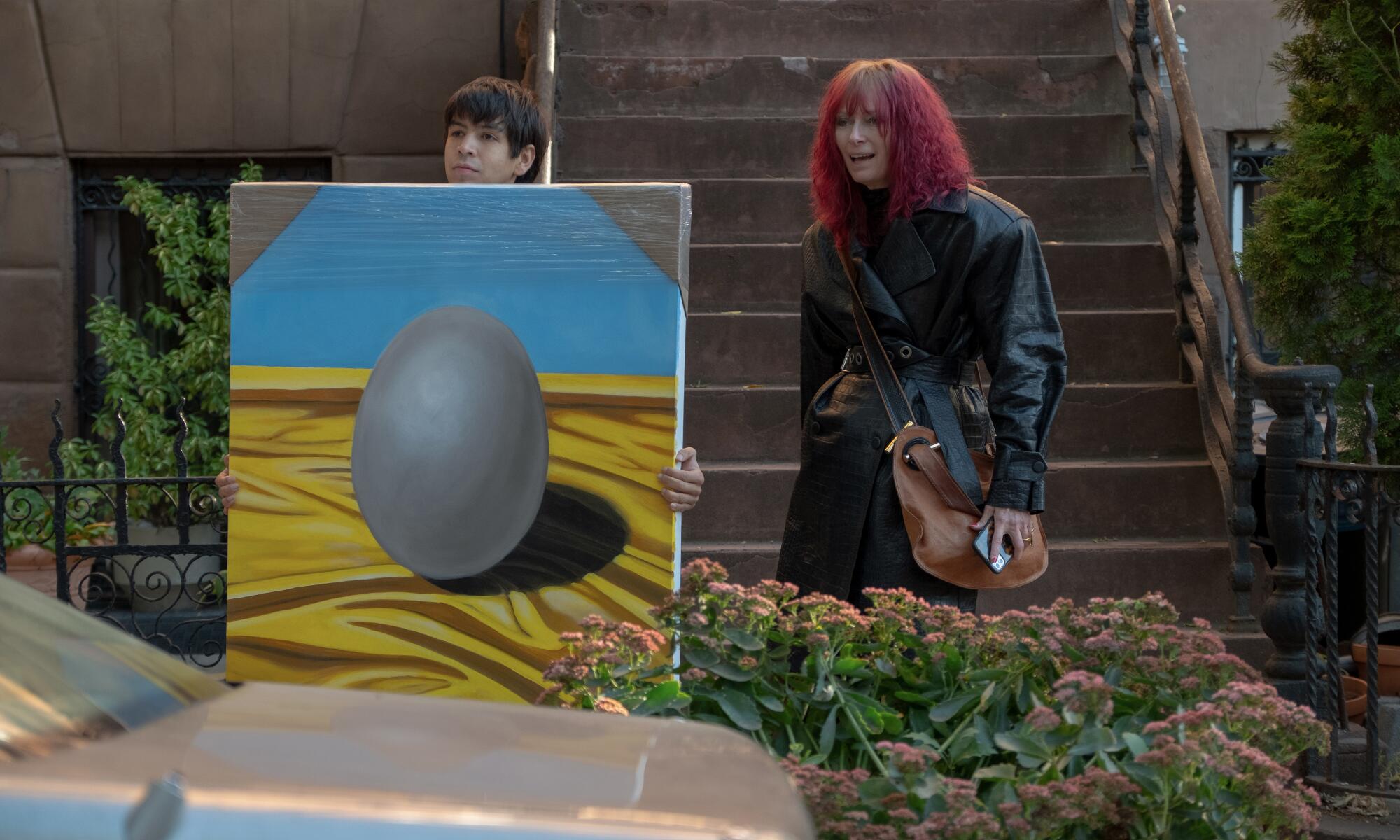
(Jon Pack / A24)
“Problemista” likewise dwells in the absurd and unreal. Torres plays Alejandro, a guileless young dreamer who wants to design toys that teach children about the “joy of obstacles.” Instead, he labors in a succession of bleak jobs as he tries to sort out his immigration status — including unsuccessfully hawking hair-salon packages on the street.
Among Alejandro’s more challenging gigs is assisting a hot-tempered art critic turned curator named Elizabeth (an inspired Tilda Swinton in a Kool-Aid-colored wig), who suggests that she might sponsor his visa application. Elizabeth, however, is more focused in burnishing the reputation of her cryogenically frozen lover, Bobby (played by RZA), an artist of dubious skill who made paintings of eggs. (“They’re not eggs, they’re hope,” he says in flashback. “They are a promise, possibilities, a mystery.”)
Torres, 37, may share a professional resume with Alejandro, but he is nothing like the timid, shuffling character of the film. (Nor, for that matter, is he anything like the imperious Andrés of “Los Espookys,” the otherworldly heir to a chocolate fortune.) Instead, over a pair of Zoom interviews I encounter a genial, self-assured writer and performer intrigued as much by process as by outcome. “There’s something about making a movie,” he says, “that feels like building a sand castle with friends.”

Julio Torres, photographed at the offices of A24 in New York City.
(Daniela Spector / For The Times)
Born in San Salvador in 1987, Torres is the eldest son of a civil engineer father and a mother who is an architect and fashion designer. From the start, his parents encouraged his creative proclivities. His mother, Tita de Torres, would help him fabricate custom Barbie houses out of cardboard. Barbie Dreamhouses, as far as he were concerned, were all wrong; he imagined Barbie in a loft. “That was the peak of opulence for me,” he remembers.
It was in these design sessions with his mom, Torres says, “where I really found the joy of collaboration.” The two, in fact, work together to this day: His mother helped design the fanciful playground depicted in an early scene in “Problemista.”
When it came time for college, an interest in film led him to study advertising. In El Salvador, “That was the closest I could find to a creative writing-filmmaking career,” he explains. He subsequently spent a short, regret-filled period at a San Salvador advertising agency. “It was a big advertising company,” he recalls. “It was like McDonald’s and Mazda. I had zero influence. I was just sort of there — I was a body in a room.”
In 2009, Torres moved to the U.S., transferring to the New School in New York, where he studied English literature. It was there that his interest in comedy was nurtured and stoked: One of his classmates was comedian Spike Einbinder, whose mother is Laraine Newman, an original cast member on “Saturday Night Live.” The pair were soon teaming up on funny videos. After college, they shared an apartment in Brooklyn.
Einbinder — along with a crappy Brooklyn apartment — both make an appearance in “Problemista.” It’s “very Method,” Torres says dryly. “The pictures that are hanging in [Alejandro’s] apartment are basically replicas of pictures we hung in our apartment.”
In the year that followed college, Torres began his quest to secure work visas while also trying to nurture a creative career. In addition to the jobs already mentioned, he worked coat check at the Neue Galerie and as an archivist for an artist’s estate. At one point, he sublet his bedroom in his Brooklyn apartment to a stranger to cover the cost of rent — something to which Alejandro also resorts in “Problemista.”
The film captures, in visually inventive ways, the arduous task of securing a visa. Craigslist, where Alejandro sources his modest jobs, is dreamily embodied as a genie-like spirit (theatrically played by Larry Owens) who teases the young man with promises of work that always fizzle. In one scene, an immigrant who is denied a visa vanishes into thin air; Alejandro’s own journey through the system is rendered as an infinite, architectural maze. Torres says he was interested in showing what “these things feel like.”
And while he didn’t set out to make an issues-driven film about immigration at a time in which right-wing politicians are attacking immigrants, Torres does hope that “Problemista” will be “humanizing” — so “we see people not as case numbers but as very specific people.”
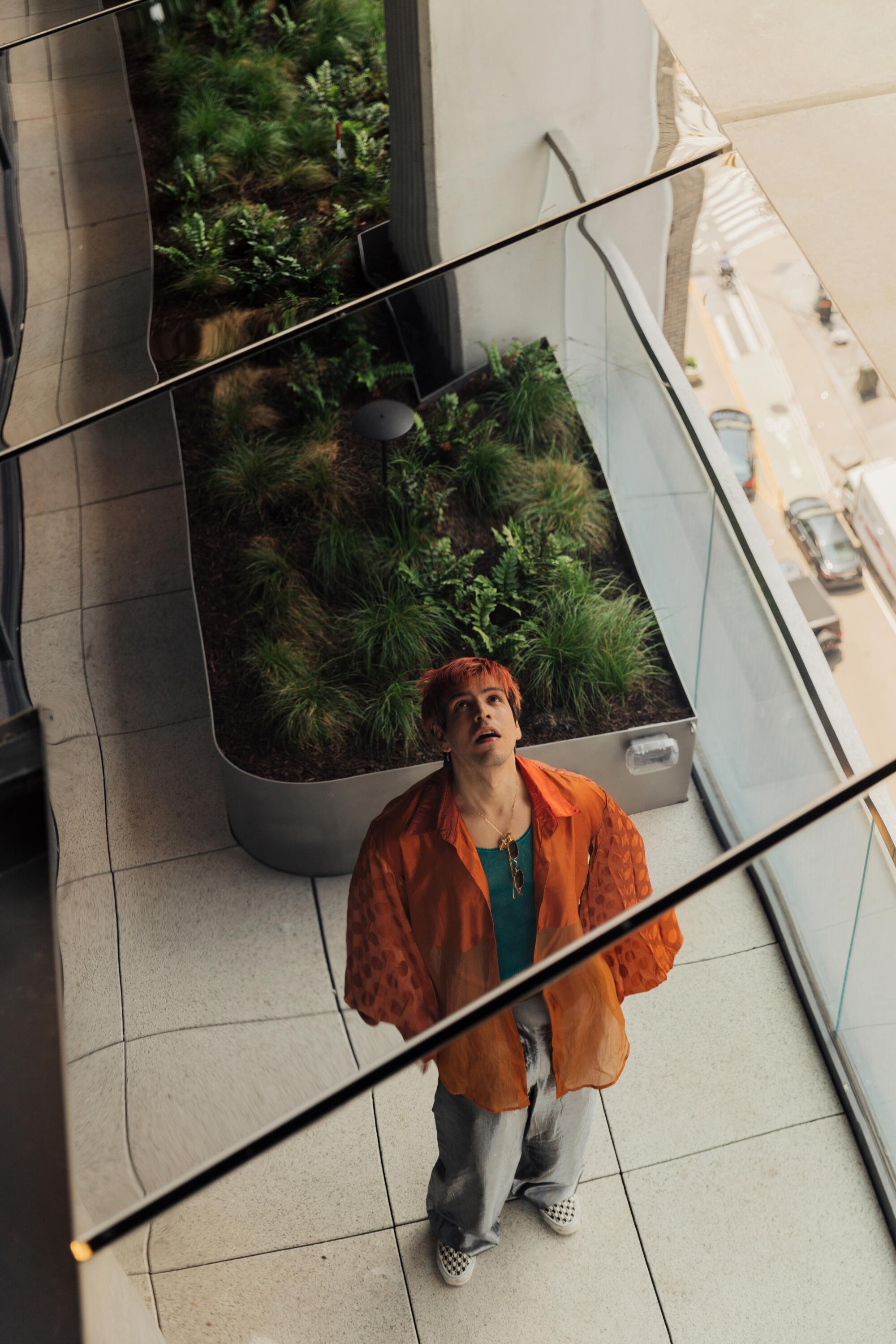
In “Problemista,” Julio Torres tried to create a hero’s journey with, as he says, “fairy tale-like qualities.”
(Daniela Spector / For The Times)
If his early years were a struggle, by 2016, Torres had hit a groove. That year, he was hired by “Saturday Night Live.” The following year, he had a stand-up special on Comedy Central. Naturally, it was no typical comedy routine. The comedian shared the stage with a pair of giant talking crystals and opened his set by announcing: “I’m Julio. I’m an Aquarius. My favorite color is clear.”
In 2019, he followed that up with the even-more-peculiar HBO special “My Favorite Shapes,” a show that was part observational comedy and part design show-and-tell. Decked out in a silver suit and plenty of body glitter, he commanded a postmodern conveyor belt that delivered a series of objects that served as points of departure for riffs on everything from “House Hunters” to the Trojan horse. “Is this one of the many good jobs I’m stealing from hard-working Americans?” he asks early on. “Because, look, I’m just doing it because no one else was doing it and it needed to be done.” (The show was an international effort: His mother, along with his younger sister, Marta, helped conceive the magnificent pastel conveyor belt.)
The HBO special, ironically, contained a gag about Swinton. At one point, Torres places a small Lucite pyramid, a mirror and a translucent pen cup on a table and describes the arrangement as “Tilda Swinton’s apartment.” There was indeed something Swinton-like in the cool, diaphanous quality of the materials.
Torres laughs when he is reminded of that bit. He had not yet met Swinton at that point. “She was but an idea to me,” he recalls. “Her aesthetic in my mind was this sort of untouchable beam of light.”
The Swinton of real life, it turns out, is neither a beam of light nor made of brittle plastic. “The person that I met is this friendly, warm, playful soul that felt familiar because she operates in exactly the same way as my collaborators in Brooklyn do,” says Torres, “people who do things because they’re fun.”
In an interview last year at South by Southwest, Swinton described Torres as next-level. “I’ve always loved him,” she said. “It’s such a thrill to call him a comrade.”
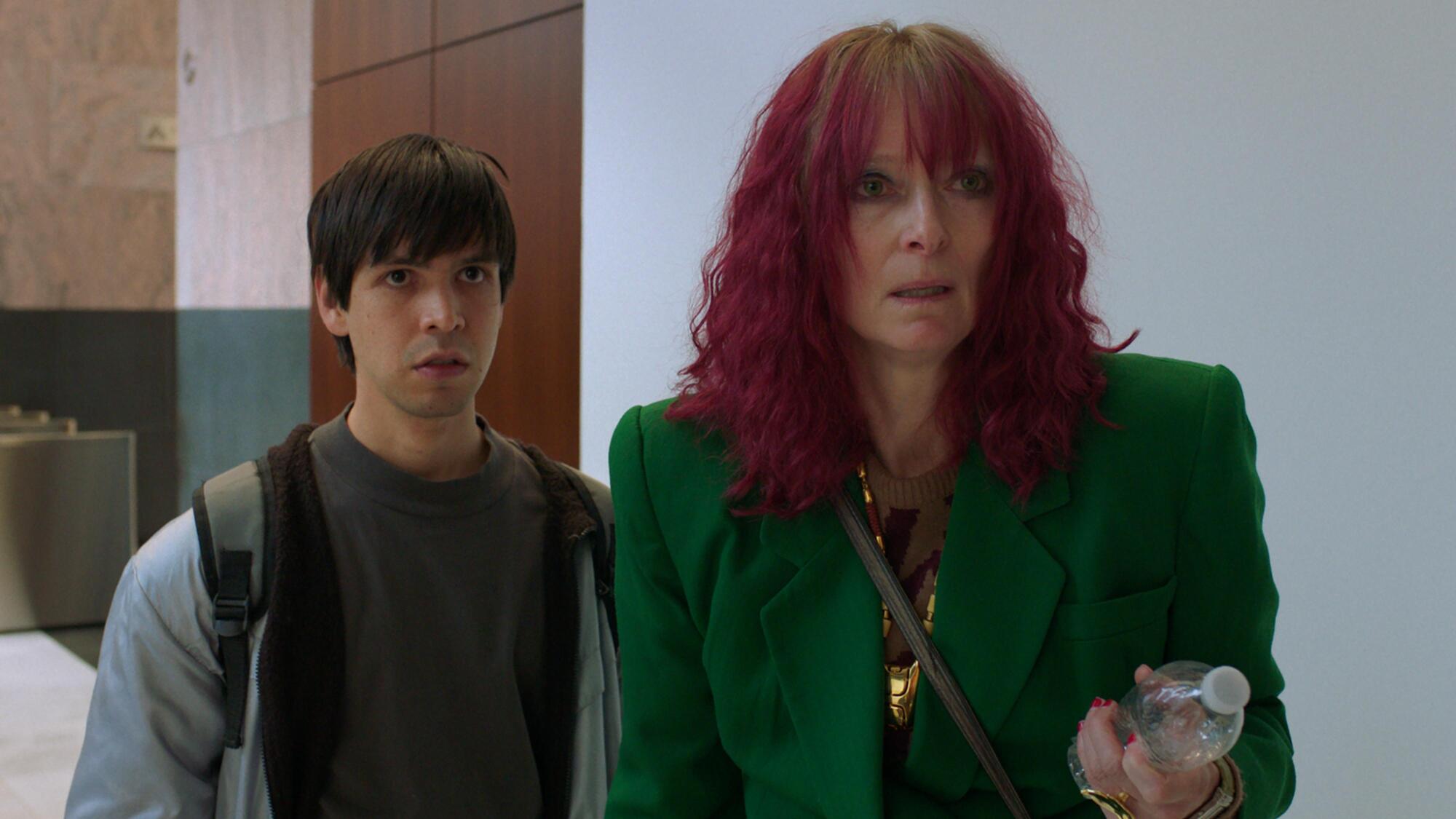
Julio Torres and Tilda Swinton in the movie “Problemista.”
(A24)
Swinton’s role is central to the film. The idea for “Problemista,” says Torres, began with the character of Elizabeth, bossy but also possessed of conviction. “I would find myself throughout the day talking like her.”
During the pandemic, as COVID-19 shuttered filming on “Los Espookys” — and everything else — Torres began to work on the script for “Problemista,” putting that voice to paper. “I really think of her as the story of that lion with the thorn in its paw,” he says. “She just assumes that people will hurt her. I think that’s true of most monstrous people, is that they are so wounded.”
It’s a personality type he says he has seen a lot in the arts (as have I). “What is it about people that work with beautiful garments or beautiful paintings or the decorative arts?” he asks. “Why are they like this?”
“Problemista,” at this point, has been a bit of a long time coming. Originally slated to debut last August, its theatrical release was delayed by the months-long Writers Guild of America and SAG-AFTRA strikes. During that time, Torres took to the picket lines and gave an impassioned speech at one demonstration.
“We strike,” he said, “so that the new me doesn’t come to this country, and instead of writing their own favorite story through their own eyes, find that they can’t, because studios would rather use AI to plagiarize mine without my consent.” He ended his speech by suggesting that it was time for studios to pay their CEOs “just slightly less than obscene amounts of money.”
The experience, says Torres, was “illuminating.” It was “the first time in my life of being so active in a union.”
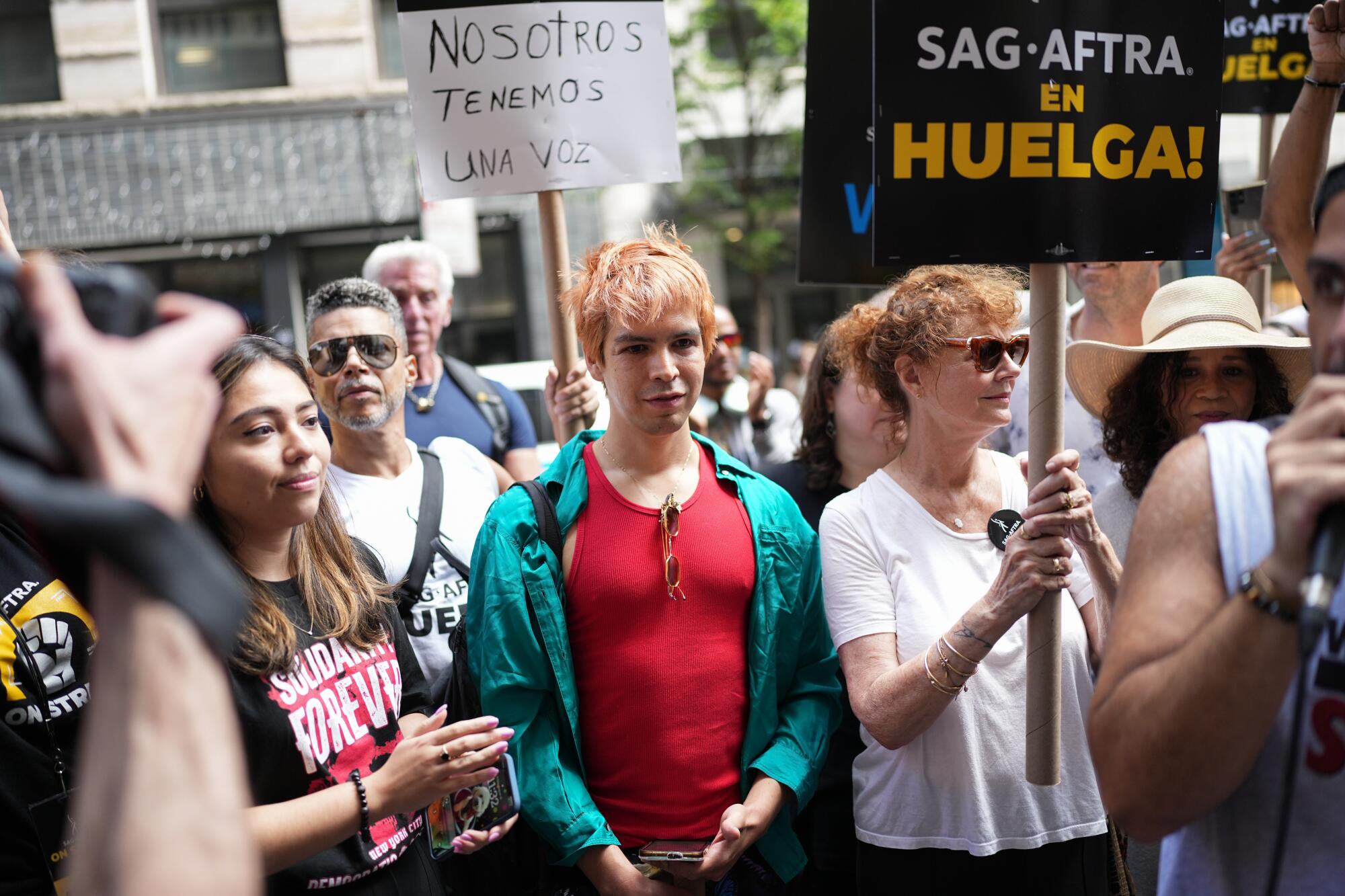
Julio Torres joins SAG-AFTRA members, including Susan Sarandon and Rosie Perez to the right, on a picket line in front of Netflix in 2023.
(John Nacion / Getty Images)
As “Problemista” hits theaters, Torres is mulling over his next projects. Currently, nothing is certain. But he would like another opportunity to direct.
“The beautiful thing about directing for me is that it sort of comes full circle and it connects the dots with my visual interests, my spatial interests and humor and writing and story writing and world-building,” he says. “Something really clicked there.”
And the visa troubles? Thankfully, those are well in the past.
